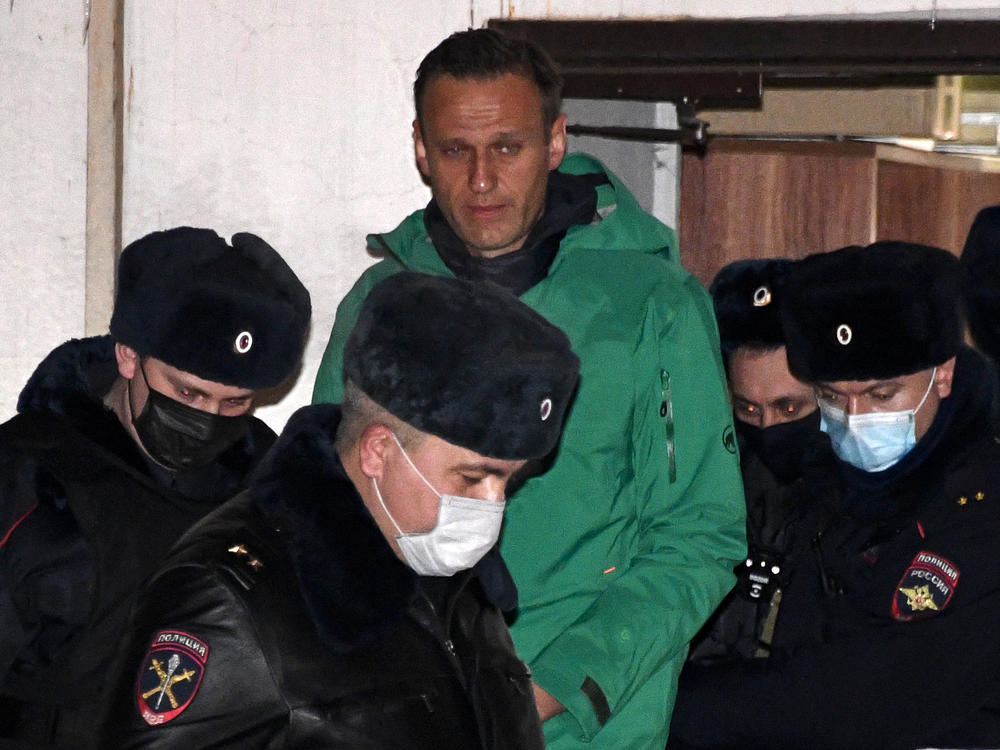Section Branding
Header Content
After Arrest, Kremlin Critic Navalny Calls On Supporters To 'Take To The Streets'
Primary Content
Russian opposition leader Alexei Navalny called on his supporters to protest after he was arrested at a Moscow airport Sunday.
"Don't be afraid. Take to the streets. Don't do it for me, do it for yourselves and your future," Navalny said in a video posted to YouTube, the social media platform that has brought his anti-Kremlin message to the farthest corners of Russia. Navalny's supporters say they will organize nationwide protests on Jan. 23.
A judge ruled to remand Navalny in custody for 30 days following his return from Germany, where he was recovering from an August poisoning that he blames on Russian President Vladimir Putin. Russian authorities had warned that Navalny would be arrested for violating the parole terms of a 2014 conviction in an embezzlement case, even though the European Court of Human Rights later ruled Russia had denied Navalny a fair trial.
Navalny appeared Monday afternoon in a makeshift courtroom inside the police station where he was being held. In a video posted by an aide, Navalny said he hadn't been allowed to see his lawyers until moments before the legal proceedings began.
"What's happening here is impossible," he said. "It's the height of lawlessness."
A Moscow court will rule next month on whether Navalny's suspended sentence of 3.5 years in the embezzlement case will be converted into a prison sentence, his lawyer Vadim Kobzev told the Mediazona website. Navalny's probation ended on Dec. 30, 2020, when he was still in Germany.
Putin's spokesman, Dmitry Peskov, has repeatedly said he would not answer any more questions about Navalny, whom he has recently referred to only as "the Berlin patient." Peskov abruptly canceled his daily call with reporters Monday, saying he didn't want to distract reporters from a press conference held by Foreign Minister Sergei Lavrov.
Lavrov accused Western governments of using Navalny's arrest to distract from problems in their own countries. Lavrov insisted that Russian officials were adhering to the law.
"If some other states believe that adhering to their own laws is less important than achieving some geopolitical goals, it's their problem," Lavrov said.
The Kremlin has consistently denied poisoning Navalny. At a press conference last month, Putin suggested Navalny worked for U.S. intelligence and was too insignificant for anyone to want to kill.
Even though international experts have determined Navalny was poisoned with Novichok, a chemical weapon developed by the Soviet Union, the Kremlin's version of events appears to be prevailing among Russians.
In a poll published by the independent Levada Center in December, almost half of respondents said they either believed Navalny had staged his poisoning or that it was a "provocation" carried out by Western intelligence agencies. Just 15% said they thought the Russian government had tried to eliminate a political opponent.
Navalny's challenge will be to mobilize his supporters to take to the streets, especially as the Kremlin has been cracking down on all forms of dissent with stiff punishments.
But a new factor in Navalny's power play with the Kremlin is that his poisoning has turned him into an international cause célèbre.
German Chancellor Angela Merkel intervened to have Navalny receive medical treatment in Berlin and then visited him in the hospital.
"The Russian authorities have arrested the victim of an attempted murder with chemical weapons and not the perpetrators," Merkel's spokesman Steffen Seibert said. "The German government urges the Russian government to release Mr. Navalny immediately and to fully investigate the chemical weapons attack on Russian soil."
Other European leaders echoed the German statement.
And though they have many differences, the outgoing Trump administration and President-elect Joe Biden's national security team agree that Navalny should walk free.
Copyright 2021 NPR. To see more, visit https://www.npr.org.

